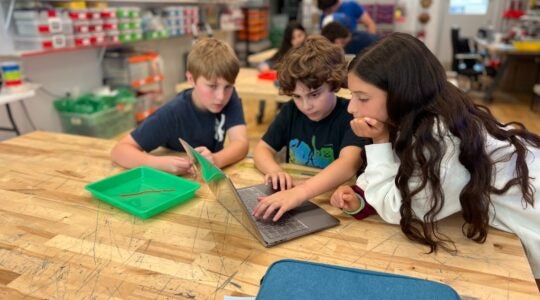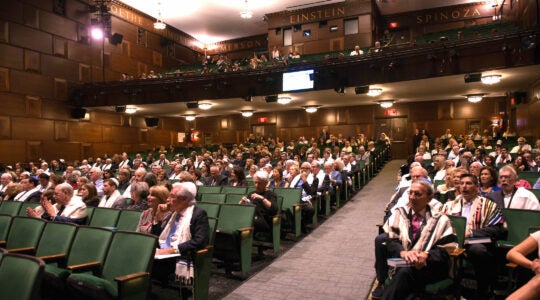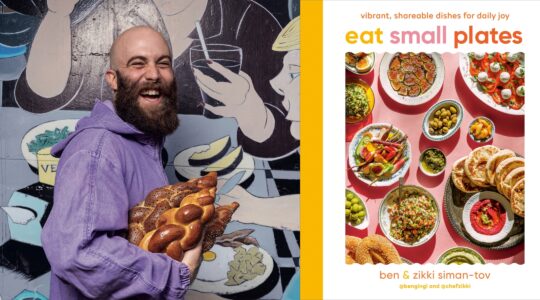The story of the Garden of Eden could be seen as a biblical truth, raising eternal questions of wrong vs. right, good vs. evil. Or it could be used as a parable, a map of the human choices we face today, exploring issues of what is knowledge and what are the consequences of it in our lives? For one Manhattan congregation, the story was recently used as a little of both, as educators set up a mock court, assigning the roles of Adam, Eve, the snake and of course God to congregants, and role playing the scenario in order to learn from it. Parents and their children sat in a circle and together played out and discussed the story from Genesis, ultimately Jewish Theological Seminary coming to some important conclusions and learning a lot in the process. “[Learning in this way] makes it friendly and involved with life, which ultimately is the goal for all of us, that religion is hand and glove with how we live life,” said Peter Harrison, father of two and member of West End Synagogue, where the mock trial took place. The activity was part of a rethinking of synagogue education by West End, one of a number of area congregations to recently revise how they carry out Jewish education with, they say, excellent results. West End and other congregations began their retooling as part of the Experiment in Congregational Education’s Re-Imagine Project, which trains synagogues in alternatives to the typical religious school experience. The Re-Imagine Project’s leaders, along with many Jewish educators, say increasingly that the current model still is your grandfather’s Hebrew School, and that no longer works. “There’s a vital sense that people are tired of the old model, it’s no longer OK for our children and parents to pass through our congregational schooling and not be changed by it,” said Cyd Weissman, director of the Re-Imagine Project as well as director of congregational education at the Board of Jewish Education in New York. “We’re going to figure out what will be life-transforming.” For Sarah Chandler, director of Jewish family life and learning at West End on the Upper West Side, “dancing through the rhythms of the Jewish calendar” is life-transforming. When she started at the synagogue in 2006, the religious school followed the typical model – until Chandler and Rabbi Yael Ridberg, “got real,” realizing they were expecting too much of families and not providing enough relevance and meaning. So they cut back Hebrew School hours, meeting only on Tuesdays instead of Tuesdays and Thursdays, required families to attend interactive programs for Shabbat and other holidays, and introduced a book club, community service projects, and all manner of ways to engage so families could learn the meaning of the Jewish life cycle while spending time together. “I think what makes it new and unique is that it’s not so new and unique,” said Chandler. “Even going back to cheder, when you went everyday after school…when it meant Jewish community was practiced at home.” Chandler said the old way of teaching Hebrew School took place in a vacuum but that now, for example, if Purim falls on a Monday the congregation will celebrate it actively on Monday, even if it means canceling school the next day. “They weren’t really learning about Purim, they were just passive receivers,” she said of her congregants in the past. But now, “they don’t just learn [something] because it’s the curriculum for fifth grade, but the teacher will see it’s Rosh HaShanah and will look what’s happening on Rosh Hashanah,” said Chandler. “The end goal is for them to show up and feel that what they’re doing is meaningful and relevant to their lives.” Mindy Davids, director of the religious school at Temple Shaaray Tefila on the Upper Eat Side, which also went through the Re-Imagine process, agrees. “You can’t sit in a classroom on a Wednesday afternoon at 4 o’clock and expect that to be a real way to learn about Shabbat,” she said. The temple this year began a program called Masa, Hebrew for journey, which likens synagogue education to the Old City of Jerusalem, where no matter what gate you enter, you always end up at the Kotel. The inaugural activity last fall focused on the shofar: families learned about the shofar together, but then children broke off to listen to storytelling and learn about the different calls, while parents studied text about the shofar. At the end, a Chabad rabbi led an activity for each family to make its own shofar. “The traditional religious school model doesn’t work, and hasn’t worked in a long time and we should be seeking out ways not even to fix it, just to completely rethink how we do it,” said Davids, who added that, with 1,600 families, Masa is only a piece of the education offered. “It doesn’t have to be a big statement, ‘we choose Judaism over soccer,’ we hope our families would make that choice but we want this to be something that would easily work for them and they don’t have to go out of their way.” Though right now even her title reflects that religious school is not a thing of the past, Davids wants that to change. “I hope one day it doesn’t exist…if you don’t want your kids to ever have to go to religious school I hope they never have to go to religious school, I hope there’s always an alternative,” she said. Robert Sherman, CEO of the Board of Jewish Education of New York, said increasingly people are recognizing the “cognitive dissonance” in religious school education, as well as the value of experiential education as being more than just an add-on but rather sometimes the most powerful part of Jewish education in the lives of participants. “That’s something we’ve got to take great note of, what does it mean and what is happening in those experiences that make it so profound,” said Sherman. “It has to be driven by the consumer, from a deep knowledge of who they are and what they value and want in their lives.” He sees a retooling of synagogue education as a major initiative of the BJE, “the next iteration following the boom of day schools.” So does Gila Hadani Ward, Director of Lifelong Learning at Temple Beth Sholom on Long Island. The religious school was the centerpiece of Beth Sholom’s education, but they have restructured to focus on the times leading up to and after religious school ends. “Families were wanting to give their kids a Jewish education but struggling with the hectic-ness of life,” said Hadani Ward. “We asked them what were their hopes and dreams for their children, and they wanted them to be good people, good Jews, to be comfortable in the synagogue. But that doesn’t only come from writing in a workbook, you have to give them tools but it also comes from the doing and active piece. Now, she said, “we’re not just talking about Shabbat, we’re doing it. We’re not just talking about tzedakah, we’re doing it.” Rabbi Alan Lucas said he sees the new focus making ripples throughout the congregation, and hopes it eventually catches on more widely. “There’s a core group that gets it, understands that the old model of dropping your kids off to Hebrew school and picking them up a few years later with the assumption that we’ll turn them into Jews doesn’t work,” said Rabbi Lucas. For Weissman, the developments in religious school education are heartening. “The mission of Jewish education is about meaning and purpose, our role is to help people find personal meaning, bringing Judaism to everyday essential questions of how do I manage stress, find joy, where do I belong?” she said. “If we understand that’s our work, sitting in a classroom is just not enough.”
The New York Jewish Week brings you the stories behind the headlines, keeping you connected to Jewish life in New York. Help sustain the reporting you trust by donating today.




